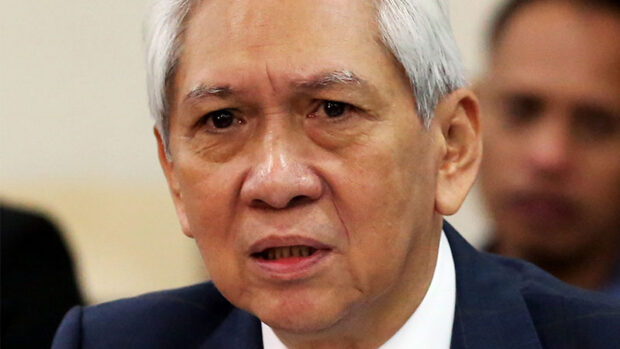Hiding COA memos fuels corruption, say groups
Activist groups and a think tank questioned on Tuesday why the country’s “top graft buster” was advocating for “greater opaqueness rather than transparency” after Ombudsman Samuel Martires urged Congress to remove provisions in the annual national budget that require the publication of Commission on Audit (COA) reports on government agencies.
In separate statements, Bayan Muna chair Neri Colmenares, Bayan secretary general Mong Palatino and Karapatan secretary general Cristina Palabay also expressed concern over Martires’ claim that the submission of receipts for the usage of confidential and intelligence funds (CIF) was unnecessary despite a 2015 joint circular from the COA and the Department of Budget and Management (DBM) regarding their release, use and audit.
“It reflects how arrogance and abuse of power are being normalized in the top layers of the bureaucracy,” Palatino said. “It’s just disappointing and infuriating [especially since] the Ombudsman is supposed to keep in check erring officials and not enable abuse.”
For Colmenares, it was surprising that Martires, a former Supreme Court associate justice, was not aware of the joint circular and had even reasoned out that submitting receipts would defeat the purpose of confidential funds.
The joint COA-DBM circular requires government agencies to submit to state auditors and other government offices concerned quarterly reports, including detailed accounting, on how they spent their confidential and/or intelligence funds and to post these reports on their official websites.
Flouting the law
“As Martires cannot feign ignorance of this circular, he is openly flouting the law,” Palabay said. “With these recent statements, questions on the Ombudsman’s compliance [with] its mandate of being the ‘protector of the people’ arise.”
Ibon Foundation executive director Sonny Africa, meanwhile, said that Martires’ proposal not to make public the audit observation reports on government agencies would only favor unscrupulous officials and pave the way for more corruption.
“If we look at our reality now, we can hardly see any accountability and transparency from our officials and there is poor accountability and transparency in the government,” the head of the nonprofit research think tank told the Inquirer in a phone interview.
Africa also found the proposal “ironic” as it came from the Ombudsman himself, the country’s top graft buster whose mandate is to act on any public complaint about any government official’s wrongdoings.
“If it’s carried by Congress, it will only make government transactions more opaque; there will be much less accountability,” he said.
Martires made the suggestion about not making COA reports public during a House hearing on his office’s proposed 2024 budget on Monday. According to him, releasing the reports often led to confusion with people jumping to hasty and unfounded conclusions.
Africa recalled the time that Martires also stopped the Office of the Ombudsman from conducting lifestyle checks on public officials, citing “illogical and vague” provisions in Republic Act No. 6713 or the Code of Conduct and Ethical Standards for Public Officials and Employees.
Under Section 4 of RA 6713, those working in government as well as their families “shall lead modest lives appropriate to their positions and income.” They are also banned from indulging in extravagant or ostentatious displays of wealth in any form.
Reducing transparency
Martires, however, insisted that the salaries of public officials do not automatically reflect their way of living.
For Africa, it appeared that the Ombudsman was “consistent” in his way of “reducing transparency” in government, considering his other proposals and suggestions to Congress concerning public documents.
In 2020, Martires restricted public access to the statements of assets, liabilities and net worth (SALNs) of government officials, including that of then President Rodrigo Duterte.
The following year, he proposed stricter penalties, including a five-year prison term, for anyone commenting on the SALN of government officials.
“It’s just ironic that the Ombudsman, whose mandate is supposedly to basically act on complaints by the people on the behavior of public officials, is in the front line to prevent the public from having the basis to make complaints,” Africa said.
The Ombudsman should be the one pushing for transparency and accountability, and not leading moves “to protect officials for behaving badly,” he added. “So I think this is a distortion of the mandate of the Ombudsman.”
For Palabay, such measures were inappropriate “at a time when we are being buffeted by reports of graft, massive corruption in high places and misuse and abuse of public funds, especially the so-called CIF.”
Reached for comment, Sen. Juan Edgardo Angara, the chair of the Senate finance committee, said the chamber would look into Martires’ recommendation.
“We will study the proposal of the Ombudsman, always keeping in mind the constitutional right of the public to information in matters of public concern,” he told the Inquirer.
The Inquirer also contacted Martires to get his reaction but had yet to receive a reply as of Tuesday night.
While Martires may not be in favor of publicizing COA reports, some of these have served as his office’s basis for meting out penalties or the filing of cases against current and former government officials.
In particular, a COA report about the Department of Education’s (DepEd) 2021 purchase, through the DBM’s Procurement Service (PS), of allegedly overpriced laptops with low-end processors led to an investigation.
As a result, the Ombudsman ordered last month the suspension without pay of incumbent and former DepEd and PS-DBM officials.
